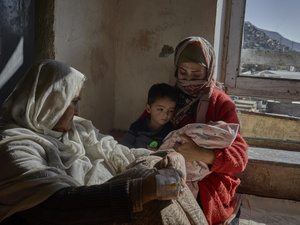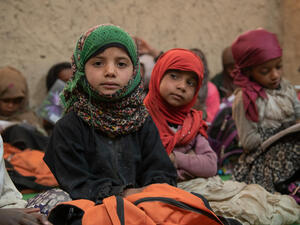Update on internal displacement in north-west Pakistan
Update on internal displacement in north-west Pakistan
As military operations intensify in Orakzai Agency of north-west Pakistan, an estimated 40,000 people (comprising 2,400 families) have sought refuge in neighbouring Hangu district of the North West Frontier Province (NWFP) over the last few weeks, according to local authorities. The internally displaced people are mainly staying with extended family and kin networks or being hosted by local families, as is the pattern in this part of Pakistan.
Local authorities have established a camp at Muhammad Khoja in Hangu district, about 20 kilometres from Hangu town towards the Orakzai Agency border, with the capacity to host 300 families to receive people without other options. (Hangu town is 112 kilometres from the provincial capital of Peshawar.) About 50 families are already residing in the camp. UNHCR has sent 100 all-weather tents to reinforce government supplies at the camp, as well as family kits of relief supplies like sleeping mats, blankets, quilts, kitchen sets and jerry-cans. Our local partner NGO Pak-CDP (Pakistan - Community Develpoment Programme) is on site to help with technical improvements at the camp, and is also helping the government assess sites for additional camps to accommodate another 1,500 families.
The difficult security situation in Hangu district hampers our access to the site, but UNHCR is working through local partners to provide assistance. We are sending an additional 300 tents to reinforce supplies at the camp and registration of the displaced people is expected to begin on Sunday by the provincial Department of Social Welfare and supported by UNHCR. Distribution of relief supplies to people staying in host communities will begin shortly.
There are reports that displaced people from Orakzai have also fled to Kohat district, though we have no firm figures. The provincial Department of Social Welfare is beginning to register displaced people today at the Jerma registration centre in Kohat town, and we expect firmer figures on the number of displaced by early next week. Tomorrow we will begin distributing family kits of relief supplies like blankets, sleeping mats and jerry cans to those people registered in Kohat. UNHCR is coordinating its activities with the District Coordinator's Office, the Provincial Disaster Management Authority, and other humanitarian agencies like UNICEF, WFP and the ICRC. Local authorities estimate up to 10,000 families (or 150,000 people) could be displaced if conflict continues in the Orakzai Agency of the Federally Administered Tribal Areas (FATA).
Further south, in Dera Ismail Khan and Tank districts of NWFP, more than 280,000 (or more than 38,500 families) people remain displaced from the earlier military operation in South Waziristan and continue to live in rented rooms and with host families. UNHCR has been distributing tents to families who have been registered and verified by the National Database Registration Authority. More than 32,000 tents have been distributed to date to help alleviate crowded conditions in host families, alongside almost 53,000 kits of relief supplies like blankets, sleeping mats, quilts and jerry cans.









